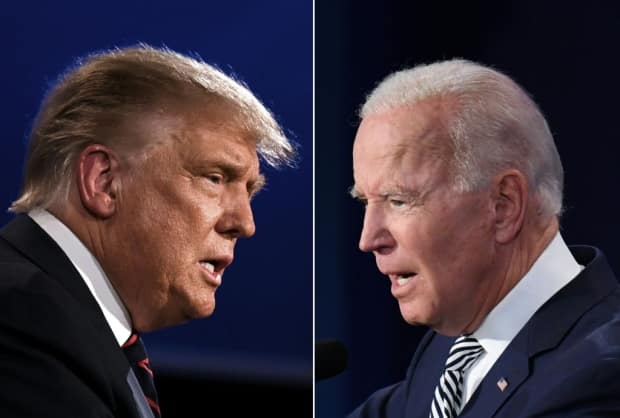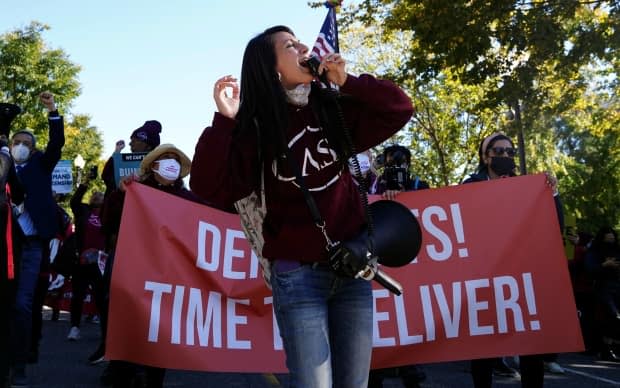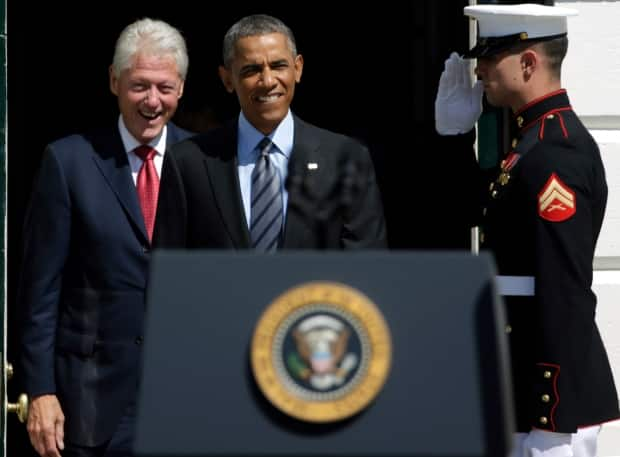Biden seeks cure for a bad case of the presidential blahs

Joe Biden has a virulent strain of a condition endemic to the American presidency: he's got a bad case of the first-year blahs.
And he's counting on a massive budget bill to cure what ails him.
Democrats are getting closer to legislative wins that would advance some priorities he campaigned on, touching climate, tax, health, infrastructure and child policies.
It's far from certain that even if his two signature bills pass it will save the party in midterm congressional elections a year from now.
Biden's approval rating is now the second-lowest of any president since the post-Watergate era at this stage of his first term.
While it's not uncommon for a president to see his approval slide in year one, this skid is steeper than most.
Among the last eight presidents, only one president had a lower approval rating in late-October of his first year than Biden's current average of 42 per cent: Donald Trump.
Outperforming Trump is no longer a given, either. One pollster, Quinnipiac, actually has Trump's current approval rating one point higher than Biden's.

Numbers like these are why polling analysts view Republicans as the clear favourite to regain control of Congress next year.
"It looks very, very bad right now [for Democrats]," said Cameron Easley, senior editor at the polling and data-intelligence firm Morning Consult.
"If things don't get much better, the question will go from whether it'll be bad to how bad it's going to get."
What's at stake in Congress
To retain control of Congress, Easley said, as a general rule of thumb, the president needs an approval rating in the low-50s — around 52 or 53 per cent, well ahead of Biden's current rate.
The stakes of next year's vote are considerable. Victory would give Republicans not only the power to block Biden's legislation, and potentially his judicial nominees, but also control of congressional committees, which would allow them to launch investigations against the president and cancel efforts such as the inquiry into the Jan. 6 attack on the Capitol.
So, what's happened with Biden's ratings?
Overall approval for President Biden
His approval rate has dropped about a dozen percentage points from his inauguration in an average of polls from different firms.
He's bleeding support virtually everywhere — with voters of different ages, races, ideologies, income groups and geographic regions.
But some of his biggest losses have been among certain income and demographic groups.
The biggest defection: working-class voters
Biden has lost the most with voters who have the least.
The steepest plunge in support is among voters making under $50,000 US a year while support has been steadier among those earning over $100,000.
Morning Consult shows Biden's approval down 18 points among those in that lower-income bracket, from 61 per cent in January to 43 per cent now.
That polling firm also shows his approval down 20 points among Black voters; 17 among Hispanic voters; and 13 among white voters.
One pollster said there's a sense Biden hasn't gotten much done.
Biden promised better access to health care, child care, climate policy, police reform, voting rights and immigration reform.
"Those are the voters saying, 'Where are the things we were promised? Why is this taking so long? Why are there roadblocks here?'" said Patrick Murray, director of New Jersey's Monmouth University Polling Institute.
"These are the groups of voters saying, 'I helped the Democratic Party get elected. What is the Democratic Party doing for me?'"
Those voters aren't satisfied with procedural excuses, he said.
It may be a fact that passing bills through the U.S. Senate usually requires 60 per cent of the votes, and Democrats don't have that many seats, so instead they're trying to cram whatever they can into a budget bill they can pass with a simple majority.
But, says Murray, that's not a persuasive argument. In voters' eyes, "You're elected to get things done."
Biden's approval since inauguration
Afghanistan, pandemic, inflation, gas prices...
External events made things worse, Murray said.
He said the U.S. retreat from Afghanistan damaged Biden because the ensuing chaos raised the notion that this administration might be less competent than expected.
Broader forces are at play beyond what Congress does or doesn't pass, Easley says.
The delta variant of the coronavirus and the summer pandemic wave; supply-chain shortages; and the rising cost of essential goods such as gasoline — all these things have, he says, soured the public mood.
One analyst who studies the Latino vote says there's a reason minority voters have been among the likeliest to waver on Biden.
It's the cumulative effect of the issues mentioned above plus additional unrealized promises important to members of those communities, said Sergio Garcia-Rios, who studies Latino voters at the Roper Center for Public Opinion Research at Cornell University.

For example, he said, there's no indication meaningful immigration reform is happening any time soon as Democrats appear incapable of getting it into the budget bill.
"There has been no signal that things are going to change," Garcia-Rios said.
A silver lining for Biden
The news isn't all gloomy for Biden.
A drop in support happens, after all, to every president in their first year. And it's not always politically fatal.
The decline in Biden's approval rating, according to Gallup, is 15 percentage points from his post-inauguration honeymoon, which is about the same experienced early on by Barack Obama, Bill Clinton and Ronald Reagan.
And they all won re-election.
Biden's decline isn't quite as dramatic as one president who lost re-election — Gallup had Jimmy Carter sliding 24 points in his first year.
Democrats also sound more optimistic they're close to a deal to pass an infrastructure bill and a massive budget bill with its tax, health, climate and family policies.
Biden released an updated set of highlights for his budget plan on Thursday and went to Capitol Hill to urge Democrats to get behind both bills.
Could this produce a bounce?
In the recent past, Trump's numbers did get a lift when he signed the biggest domestic legislation of his presidency, a tax-cut bill in 2017.
But it was temporary.

Trump's Republicans got thrashed in the next year's midterms.
And the bottom line is that's the historical norm. The average loss of House seats for a president's party, since the 1970s, in a first midterm, is 28.
Democrats only have a four-seat advantage.
So unless things change, one year from now, in the midterms of Nov. 8, 2022, Republicans will have new power in Washington.
Budget bill is no panacea
So, what about that budget bill? Months of negotiations among Democrats have resulted in parts being chopped, and its latest version is about half the size of the $3.5 trillion Biden originally proposed.
Don't expect a watered-down bill to reverse the political trend line, Murray said.
"If it's just tinkering with the edges, that's going to be problematic," Murray said. "If [voters] feel there are too many compromises, it doesn't really matter how big the bill is."
WATCH | Back in April, Biden made a lot of promises in 1st address to Congress:
Easley agreed Democrats dropped some popular policies to convince moderate senators to support the bill, and the end result might disappoint some Biden supporters.
For example, he said, the biggest political winner in the package was a plan to lower drug prices by making pharmaceutical companies negotiate with the federal government, as happens in other countries.
That idea was reportedly nixed by Arizona Sen. Kyrsten Sinema.
"It looks like an opportunity missed," Easley said.


